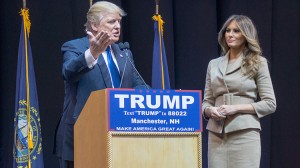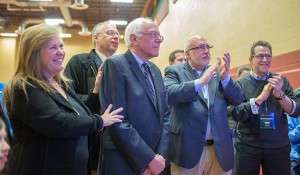Outsiders Rule in New Hampshire
February 10, 2016
In New Hampshire on February 9, the first of many primary elections was held in the process that will eventually choose candidates for the 2016 U.S. presidential election. (A caucus was held in Iowa before New Hampshire’s vote, but by state law, New Hampshire is obligated to hold the nation’s first primary.)
For the Democrats, Vermont Senator Bernie Sanders registered a big win over his rival, former Secretary of State Hillary Clinton. Sanders raked in 60 percent of the vote, earning an estimated 15 of the state’s 24 delegates. Sanders is considered an “outsider” for his staunchly progressive (favoring improvement and reform) views and for shunning corporate money for his campaign. Traditionally, Sanders has also been independent of party, although he has generally sided and caucused (met to discuss leadership or policy votes) with the Democrats. Clinton’s political history and collection of corporate donations has labeled her the establishment candidate, despite the fact that she is attempting to become the first woman president of the United States.
On the Republican side, New York businessman Donald Trump was the winner with 35 percent of the vote, earning an estimated 11 delegates. Ohio governor John Kasich came in a surprise second, with 16 percent and 4 delegates. Former governor Jeb Bush and senators Ted Cruz and Marco Rubio rounded out the field at about 11 percent, probably earning 3 delegates each. Trump has never held political office, so the primary result could be seen as a rebuke to the candidates of the Republican establishment.

Donald Trump
Credit: Marc Nozell (licensed under CC BY 2.0)
Both Sanders and Trump were seen as long-shot “outsiders” to win their party nominations when they first announced their campaigns. Both candidates, however, have gained tremendous momentum as they preach a shared disdain for the way things are run in Washington, D.C. That is where the comparisons end, however, as Sanders and Trump represent opposite ends of the political spectrum.



